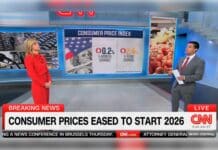(Daily Caller News Foundation) — Americans are having an increasingly hard time making their credit card and car payments as Biden-era price increases and a worsening labor market have decimated their pocketbooks, according to The Wall Street Journal.
![]()
Nearly 10% of credit-card balances and 8% of auto loan balances became past due in the last year—the highest rate of credit card delinquencies the U.S. has seen in over a decade, according to the Federal Reserve Bank of New York. Executives at major lenders like Citigroup and Ally Financial have noted the trend, with Ally’s stock falling 18% last Tuesday after its Chief Financial Officer Russ Hutchinson reported the quantity of charge-offs—balances that the company wrote off because borrowers were unlikely to pay—was higher than expected in July and August, the WSJ reported.
“[Borrowers at Ally] have been struggling with the cost of living and now are struggling with an employment picture that’s worse,” Hutchinson told the WSJ.
The increase in unrepaid loans is expected to continue, with Bread Financial—a credit-card issuer that serves more lower-income borrowers than larger financial institutions—expecting the rate to remain elevated through the end of 2024, while fellow credit-card issuer Synchrony Financial said it is experiencing higher delinquency rates than before the COVID-19 pandemic, according to the WSJ.
Prices have risen more than 20% since President Joe Biden took office in January 2021, peaking at 9% in June 2022. Inflation sat at just 1.4% at the end of former President Donald Trump’s term.
Alongside elevated prices, interest rates for credit cards have also increased, climbing to 21.51% as of May, up from roughly 15% in 2019, according to the Federal Reserve Bank of St. Louis (FRED). The Federal Reserve has held its target federal funds rate at a 23-year high range of 5.25% to 5.50% for eight straight Federal Open Market Committee (FOMC) meetings in order to combat inflation.
Elevated rates hike interest payments, and, consequently, have helped drive the surge in overdue balances. Delinquencies reached their highest level in the first quarter of 2024 since the Federal Reserve Bank of Philadelphia began tracking the metric in 2012, as total revolving balances rose to $628.6 billion.
High rates have also made car payments less affordable, with the rate on a 60-month loan for a new car hitting 8.2% in May, up from 5.3% in 2019, the WSJ reported.
In addition to inflation and high borrowing costs, the U.S. “employment picture” has also worsened, with job growth coming in below economist expectations in both July and August, and unemployment currently sitting at 4.2%, well above the 3.4% rate seen in April 2023, according to FRED.
Faced with the combination of high interest rates, price increases and joblessness, American consumers have hemorrhaged savings, with the personal savings rate—the percentage of disposable income that Americans have saved—falling from over 25% during the COVID-19 pandemic to just 2.9% in July.
Ally Financial did not immediately respond to a request for comment.
This article was originally published at the Daily Caller News Foundation.











